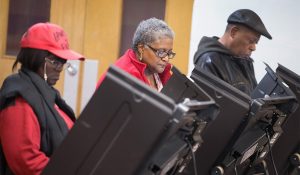
Election day in Ferguson, Missouri, November 2014. Photo by Scott Olson/Getty Images
Born out of protest against police brutality, Black Lives Matter has become a nationwide movement aimed at raising awareness of the violence committed against Black bodies at the hands of police.
Strained race relations remain at the forefront of this year’s presidential election as candidates and political pundits search for a guide on how to address the immediate concerns of the nation’s African-American voters. While political figureheads like Donald Trump have openly criticized the group for its “anti-police” rhetoric, others have used the movement as an agent to tackle the issue of racial inequality — and garner electoral support in the meantime.
However, a recent study suggests Black Lives Matter may not have much influence on the voting behaviors of African-Americans like previously thought.
According to a 2016 Pew Research survey, general awareness of the Black Lives Matter movement is widespread among white and African-American adults, but ideas and attitudes about the movement vary between each group. For example, only 4 in 10 Americans support Black Lives Matter; 65 percent of African-Americans expressed strong support of the movement compared to 40 percent of whites.
But things get a little murky when determining how the Black electorate will vote based on the perceived influence of the Black Lives Matter movement. Earlier this month, a poll from Monmouth University found that half of Black voters felt the movement made little to no impact on the nation’s race relations; another 21 percent believed Black Lives Matter actually made things worse.
“Most Americans agree that Black Lives Matter has shined a light on important issues of race, but there is a significant split on the impact that attention is having,” said Patrick Murray, director of the Monmouth University Polling Institute.
While analyzing data from a survey fielded as part of his doctoral research, writer Theodore R. Johnson found that attitudes about the Black Lives Matter movement affected the voting behavior of different parts of the African-American electorate in a variety of ways.
According to The Atlantic, Johnson’s survey presented 366 Black respondents with multiple hypothetical election scenarios to determine the impact of various factors on their voting choices. These factors included the state of the economy, health care costs, positions on abortion and same-sex marriage, and ideas on reducing racial inequality, among others.
Respondents were then asked how best to reduce racial inequality and discrimination and presented with political candidates supporting contrasting strategies — one candidate who favored the Black Lives Matter Movement and new civil-rights legislation and another who promoted increased access to economic opportunity by means of hard work and self-determination, the paper reports.
The results revealed that Black Lives Matter had little impact on Black voter behavior, compared to other factors.
When broken down along gender lines however, Black men were just as likely to vote for the candidate in support of economic opportunity and hard work as the best way to tackle racial inequality as the candidate who backed Black Lives Matter and civil rights legislation. In contrast, African-American women were more likely to support the candidate who favored Black Lives Matter.
Age played a factor in voting behaviors as well. According to the survey, Black voters aged 18 to 24 were much more likely to vote for a candidate who supported the movement, as were those between 25 and 44. Those over age 45 were equally as likely to vote for the candidate who promoted economic opportunity and hard work as the one who favored Black Lives Matter and new civil-rights legislation.
African-American voters with an annual income of less than $60,000 and more than $150,000 were more likely to back the candidate who supported the movement. However, those with a yearly income between $80,000 and $100,000 were much more likely to support the candidate poised on economic opportunity and self-determination, The Atlantic reports.
Lastly, no other group of Black voters stressed the importance of Black Lives Matter in its voting preferences more than single parents. The respondents in this group were more likely to vote for the candidate who stressed support of the anti-police brutality movement and civil rights legislation, rather than the candidate who emphasized an economic approach to solving racial inequality. According to the publication, the results were likely driven by the more liberal leanings of young, Black women compared to the rest of the Black electorate.


